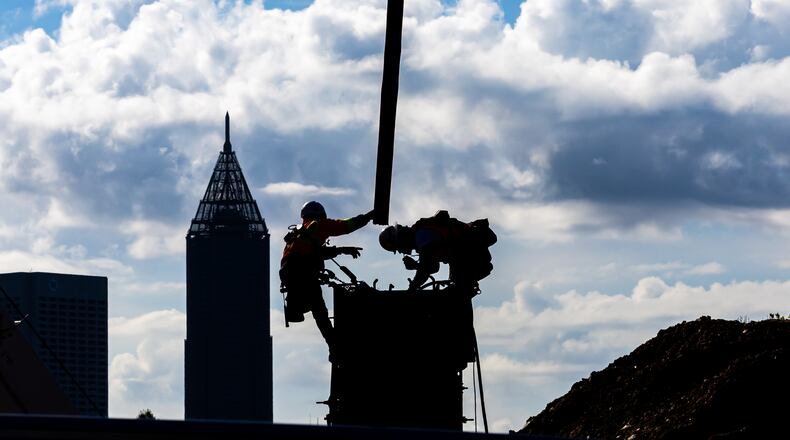Economic matters still rate as the top issues on Georgia voters’ minds with a little more than six weeks to go before this year’s presidential election, but new polling shows that voters have tilted — tentatively — toward optimism.
Views of the economy have grown rosier, with 58% of respondents saying they expect the economy to improve over the next 12 months, according to a poll conducted this month for The Atlanta Journal-Constitution. That’s up from 42% who felt that way in June. In January, that figure was just 36%.
In Georgia, a battleground state that President Joe Biden flipped to the Democratic column in 2020 by fewer than 12,000 votes, sentiments about the economy and prospects for the future could prove pivotal. Biden is out of the race, but Vice President Kamala Harris, the Democratic nominee, has worked to defend the administration’s record while seeking to define her own economic plans. Former President Donald Trump, the Republican nominee, is trying to prove he is better for voters’ pocketbooks.
“It’s getting better again, but it’s going to take a little time,” said Claudia Ingram, a 60-year-old language translator in Cobb County who supports Harris. But she’s encouraged by falling inflation and lower gas prices.
“Numbers don’t lie,” Ingram said.
That sense of optimism isn’t universal, and many voters still say they feel squeezed by inflation. Prices, on average, are not rising as much, but they are significantly higher than they were in early 2021.
“You can look at anything that you spend money on and see that you were a lot better off four years ago than you are today,” said Dan McMillian, a 68-year-old Pickens County resident who works in sales. He said his vote is locked in for Trump.
The most recent AJC poll showed that nearly 20% — about one in five — expect the economy to deteriorate over the next year. Still, that’s down from more than half in January.
Trump and Harris are locked in a tight race in Georgia, with Trump drawing 47% of likely voters while Harris was at 44% — within the AJC poll’s margin of error of 3.1 percentage points. It was conducted Sept. 9-15 for the AJC by the University of Georgia’s School of Public and International Affairs.
Voter outlook on the economy seems shaded by income, but the best-paid voters are not the most sanguine — just the opposite.
Among those with income of more than $150,000, slightly fewer than half saw improvement coming. Among those with an income of $100,000 to $150,000, 57% predict improvement. Those with higher incomes also had the highest share of voters saying they thought things would get worse.
In contrast, the most upbeat view came from those with the lowest incomes. More than 70% of respondents with income below $25,000 said they think the economy will strengthen in the coming 12 months.
Perspective matters
Voters experience only their own corner of the economy, but it’s a visceral, emotionally charged daily reality: grocery bills and restaurant tabs, mortgage and rental payments, gasoline fill-ups and airplane tickets.
For Rhonda Williams in Fulton County, the Biden-Harris Administration’s student debt forgiveness policies outweighed all other financial changes the past four years. The 50-year-old hotel guest services manager said she believes policies like that show Harris cares about everyday workers.
“That took so much of a weight off me,” Williams said. “Having that kind of debt come off your credit report and allowing you to do other things, it’s just a lifesaver.”
Several voters on both sides of the aisle were quick to mention Wednesday’s interest rate cuts by the Federal Reserve and whether or not that was politically motivated to benefit Harris, the sitting vice president. (The nation’s central bank operates independently from the executive branch of government).
Tonya Pimson, a full-time caregiver for her husband in Barrow County, said gas prices have started to drop, but she doesn’t expect it to last. The 69-year-old fears that politics are at play.
“They push the gas prices down now because they want us to vote Democrat,” Pimson said. “But as soon as it ends, it goes sky high again, just like how it did when Biden went in (office).”
Interpreting inflation
Voters impressions of the economy don’t always neatly align with economic data.
Many voters told the AJC they believed the economy was in recession when the statistics firmly proclaimed the opposite. The economy is growing, with solid hiring and strong wage gains, though there are signs of slowing.
Yet voter dismay is not really a delusion.
The economy came out of the painful 2007-09 recession slowly but steadily grew through both the Obama and Trump administrations until the pandemic struck in the spring of 2020.
The following recovery was robust but fraught.
Huge numbers of jobs were added, but by mid-2021 households were wading through a wave of inflation as prices jumped on groceries, rents and many consumer goods. Then, in 2022, the Russian invasion of Ukraine sent gas prices soaring.
The average gallon of regular unleaded in metro Atlanta, which had cost $3.15, rose to a high of $4.54 in June 2022 before very slowly descending. The region’s average was $2.98 on Thursday, according to Gas Buddy, the lowest since January.
“We’re a country based on our energy, and we’ve got to get back to producing our own energy rather than buying it from abroad,” said retired IT director Jim Bozeman, 77, of Jones County, who is supporting Trump.
Credit: Jenni Girtman
Credit: Jenni Girtman
Bozeman said he believes Trump will reduce alternative energy programs aimed at reducing climate change, which he said will reduce costs throughout the logistics supply lines that trickle down to consumers. The most recent federal data show the U.S. is drilling more oil now than it was under Trump.
Price hikes in 2022-2023 were not as bad as during four previous bouts of inflation, but they were worse than anything Americans had seen since 1983.
Economists blame a host of factors for inflation, among them supply chain snarls, robust consumer demand coming out of the pandemic, government spending and aggressive stimulus by the Federal Reserve. But for consumers, the results were frightening.
Inflation, which had been below 2% when Biden took office, climbed to 9% in June 2022, with grocery prices soaring at a 35%-a-year clip. By then, the Federal Reserve was aggressively lifting interest rates, which undercut inflation but added to the cost of credit cards, auto loans and mortgages.
“Voters tend to vote their pocketbook,” said McMillan, the Pickens County voter who backs Trump. “Anybody that’s gone out and bought groceries, gone out to a restaurant, gone to a movie or bought gasoline … we’re taking a hell of a hit during this administration.”
Mortgage rates had been at historic lows in 2021 — well below 3%. With the Fed’s actions, they more than doubled, cresting last fall at nearly 8%. But they’ve come down, and with the rate-cutting campaign expected from the Fed, in recent days the average dipped close to 6%.
‘The president isn’t God’
Overall wage increases eventually caught up, and inflation this year sank nearly back to prepandemic levels. Grocery prices this past year are up less than 1%, according to Bureau of Labor Statistics.
But prices weren’t dropping, and a lot of people felt shaken. Some had fallen into debt, and some — especially those on fixed incomes — felt overwhelmed.
Credit: Ziyu Julian Zhu/AJC
Credit: Ziyu Julian Zhu/AJC
Experts say presidential power over the economy is wildly overstated. Yet it is widely accepted that economic distress moves voters to reject incumbents, while booms often lead to reelection.
“The president isn’t God,” said Steven O’Brien, a 31-year-old delivery driver from Forsyth County, who declined to say who he supports this election cycle. “They can’t just fix every problem, but they can be a linchpin upon which other people can help fix the problems.”
Moreover, there is often a lag in perception.
By common measures, the economy was doing well long before voter sentiment began to grow more rosy. And yet now, as Georgians are more upbeat, there are fears that the growth engine is decelerating with the Federal Reserve lowering interest rates to prevent a stall.
Still, when it comes to the economy and politics, what sometimes matters most is direction — whether it is getting better or worse. For instance, the unemployment rate and inflation rate in late summer 1984 both were higher than they are currently.
But voters and media saw the economy improving, and the incumbent — Ronald Reagan — won a landslide victory.
This time, voters had been very critical of the incumbent — Biden — for his handling of the economy, despite several years of generally positive statistics. Biden no longer is on the ballot, but his vice president is.
There is no evidence of a Reagan-level shift from one candidate to another. But there are signs in the AJC poll that when it comes to the economy, more Georgia voters are positive.
Keep Reading
The Latest
Featured




